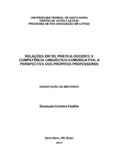| dc.creator | Padilha, Emanuele Coimbra | |
| dc.date.accessioned | 2015-05-22 | |
| dc.date.available | 2015-05-22 | |
| dc.date.issued | 2015-02-06 | |
| dc.identifier.citation | PADILHA, Emanuele Coimbra. RELATIONS BETWEEN TEACHING PRACTICE AND LINGUISTIC COMPETENCE-COMMUNICATIVE: THE PERSPECTIVE OF OWN TEACHERS. 2015. 116 f. Dissertação (Mestrado em Letras) - Universidade Federal de Santa Maria, Santa Maria, 2015. | por |
| dc.identifier.uri | http://repositorio.ufsm.br/handle/1/9917 | |
| dc.description.abstract | This work aimed at investigating the relations between teaching practice and Language-communicative competence of Spanish Foreign Language teachers from the public school, through the inference of their beliefs. Therefore, we identified the beliefs about linguistic and communicative competence of teachers and, as a result, these beliefs were related to their performance reported by the participants themselves in the classroom. The participants of this study were two Spanish teachers, working in public schools in Santa Maria city, who performed the initial training in Letters-Spanish graduation at the Federal University of Santa Maria. The methodology used was a qualitative study of case, based on metacognitive approach beliefs research (BARCELOS, 2001). We applied a questionnaire to answer the main purpose. Secondly, a semi-structured interview was made. The results showed that these teachers believe Linguistic competence communicative is characterized by complementarity of linguistic and communicative component. This division into two components still carries a structuralist notion that considers the linguistic part precedes and prevails on the communications components and also that this is a belief that may have been caused by the influence of the nomenclature linguistic and communicative competence, by Almeida Filho (1993), adopted in this study. In relation to teaching practice reported by the teachers, it was found that the beliefs presented by the participants directly influence on performance. Thus, we concluded that the insufficient linguistic and communicative competence of the teacher leads to severe limitations in educational performance in relation to the oral performance. | eng |
| dc.format | application/pdf | por |
| dc.language | por | por |
| dc.publisher | Universidade Federal de Santa Maria | por |
| dc.rights | Acesso Aberto | por |
| dc.subject | Crenças | por |
| dc.subject | Competência linguístico-comunicativa | por |
| dc.subject | Atuação em sala de aula | por |
| dc.subject | Professores de língua estrangeira | por |
| dc.subject | Beliefs | eng |
| dc.subject | Linguistic competence-communicative | eng |
| dc.subject | Performance in the classroom | eng |
| dc.subject | Foreign language teachers | eng |
| dc.title | Relações entre prática docente e competência linguístico-comunicativa: a perspectiva dos próprios professores | por |
| dc.title.alternative | Relations between teaching practice and linguistic competence-communicative: the perspective of own teachers | eng |
| dc.type | Dissertação | por |
| dc.description.resumo | Este trabalho teve por objetivo investigar relações entre prática docente e competência linguístico-comunicativa de professores de Espanhol Língua Estrangeira da escola pública, por meio da inferência de suas crenças. Para tanto, identificaram-se as crenças sobre a própria competência linguístico-comunicativa dos professores e, na sequência, essas crenças foram relacionadas com a atuação relatada pelos próprios participantes em sala de aula. Os sujeitos deste trabalho foram duas professoras de língua espanhola, atuantes em escolas públicas da cidade de Santa Maria, que realizaram a formação inicial no Curso de Letras-Espanhol da Universidade Federal de Santa Maria. A metodologia utilizada foi um estudo qualitativo de caso, baseada na abordagem metacognitiva de investigação de crenças (BARCELOS, 2001). Para responder ao objetivo principal, aplicou-se um questionário. Num segundo momento, realizou-se uma entrevista semi-estruturada. Os resultados mostraram que os professores acreditam que a competência linguístico-comunicativa caracteriza-se pela complementaridade do componente linguístico e do comunicativo. Essa divisão em dois componentes ainda carrega uma noção estruturalista que considera que a parte linguística antecede e tem primazia sobre os componentes comunicativos e, ainda, que essa é uma crença que pode ter sido originada pela influência da nomenclatura competência linguístico-comunicativa, de Almeida Filho (1993), adotada neste trabalho. Com relação à prática docente relatada pelas professoras, verificou-se que as crenças apresentadas pelas participantes influenciam diretamente na sua atuação. Nesse sentido, concluiu-se que a insuficiência na competência linguístico-comunicativa do professor leva a severas limitações na atuação docente no que se refere ao desempenho oral. | por |
| dc.contributor.advisor1 | Marchesan, Maria Tereza Nunes | |
| dc.contributor.advisor1Lattes | http://lattes.cnpq.br/5214558523776194 | por |
| dc.contributor.referee1 | Sturm, Luciane | |
| dc.contributor.referee1Lattes | http://lattes.cnpq.br/2133499929455953 | por |
| dc.contributor.referee2 | Motta, Vaima Regina Alves | |
| dc.contributor.referee2Lattes | http://buscatextual.cnpq.br/buscatextual/visualizacv.do?id=K4702591T0 | por |
| dc.creator.Lattes | http://lattes.cnpq.br/0007250748699766 | por |
| dc.publisher.country | BR | por |
| dc.publisher.department | Letras | por |
| dc.publisher.initials | UFSM | por |
| dc.publisher.program | Programa de Pós-Graduação em Letras | por |
| dc.subject.cnpq | CNPQ::LINGUISTICA, LETRAS E ARTES::LETRAS | por |


